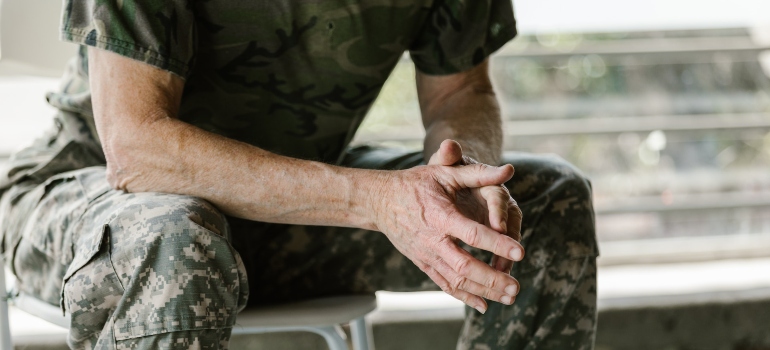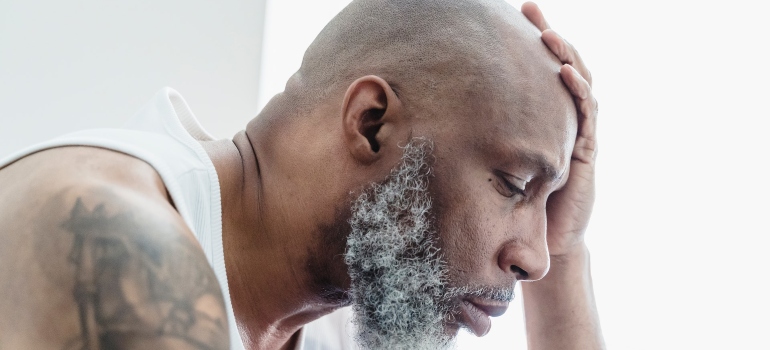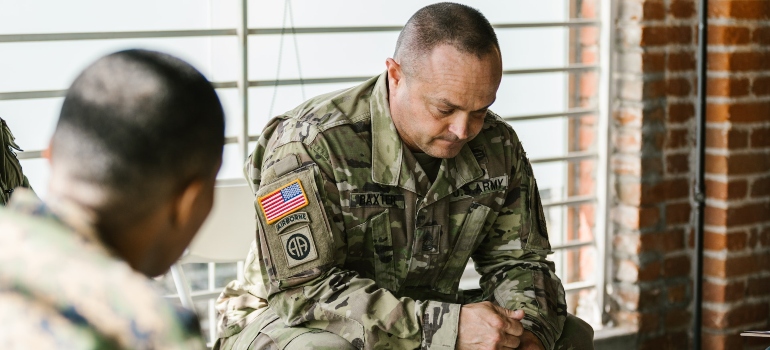Drug Rehab for Veterans
Our programs are tailored to meet the unique needs of former military personnel. Let us honor your service by providing the care and support you deserve on your path to a brighter future.
The psychological consequences of military service and everything that comes with it stay with veterans, even years after their last deployment. As a result, many develop severe addictions to alcohol or drugs in order to cope with everything they have gone through. Here at Harmony Ridge Recovery Center, we recognized the necessity for rehab for veterans and created a special rehab program for people who actively served our country. If you are a veteran or a family member of one, we want you to know the doors to our rehab center are open for you. The team of addiction recovery experts is there to attend to your needs and help you achieve long-term sobriety.

Who Qualifies as a Veteran?
The legal definition of a veteran under Title 38 of the U.S. Code is “a person who served in the active military, naval, air, or space service, and who was discharged or released therefrom under conditions other than dishonorable.” Generally, the individual must have “active military, naval, or air service” to qualify as a veteran for most government purposes.
What Is a Substance Use Disorder (SUD)?
A substance use disorder is usually referred to as an “addiction.” It’s a disease that causes people to have problems controlling their use of alcohol, drugs, and other substances. Left untreated, this disease can negatively influence many parts of a person’s life.
What Are the Symptoms of a SUD?
- An increased urge to use alcoholic drinks or drugs
- Being unable to stop using substances despite the negative effects
- A change in relationships because of substance use
- Feeling anxious or depressed about your substance use
- Feeling sick and going through withdrawal symptoms when substance use is stopped or cut back
- Increased tolerance – this refers to the need overtime for more frequent or stronger doses of alcohol or drugs to achieve the initial effects
- Addiction is the most severe stage of SUD, which features a loss of self-control that leads to compulsive drug-seeking regardless of a desire to stop using
Substance Use Disorders Among Veterans
SUDs remain a problem among veterans and military members. This is partly due to the fact that in these groups of people, alcohol use is common and is typically used for socializing and stress relief.

SUDs are linked to significant negative medical, psychiatric, interpersonal, and occupational outcomes. One study even discovered that about 30% of completed suicides and about 20% of deaths by military personnel caused by high-risk behavior could be attributed to alcohol or drug use, hence the need for drug rehab for veterans.
Why is substance abuse prevalent among veterans?
The U. S. has spent two decades in continuous war. Thus, people with personal military connections have raised public and professional concerns for the mental health of veterans and service members. Alcohol and other drugs are frequently used by veterans and military personnel to help deal with anxiety, stress, depression, and other mental challenges. Increased substance use can lead to serious long-term consequences such as addiction, though. That’s why drug rehab for veterans is a necessary program.
VA Substance Abuse Programs
Veteran Affairs (VA) provides a number of rehab options for veterans who need treatment for substance use issues. The services offered by VA depend on the veteran’s needs and can include medication options such as:
- Medically managed detox to stop substance use safely
- Drug substitution therapies and medications to reduce cravings for alcohol and opiates
- Nicotine replacement for stopping tobacco use
Drug rehab services offered by VA can also include counseling and other therapy choices such as:
- Cognitive-Behavioral Therapy (CBT) — CBT teaches individuals how their faulty beliefs are influencing their behaviors and how to change them.
- Short-term or intensive outpatient therapy
- VA inpatient rehab therapy
- Continuing care
- Marriage and family counseling
- Relapse Prevention – Relapse prevention teaches clients how to cope with cravings and triggers for drugs or alcohol to avoid a relapse
- Special therapeutic programs for veterans with certain specific issues (such as women veterans, returning combat veterans, and homeless veterans)
Further drug rehab services possibly offered by VA include treatment for specific substance abuse-related disorders and symptoms such as:
- Pain
- Anger
- Sleep difficulties
- Post-traumatic stress disorder
- Depression
What are the Most Common Mental Health Problems for Veterans?
The most common mental health conditions facing veterans are:
- Post-traumatic stress disorder (PTSD)
- Depression
- Suicide
- Traumatic brain injury (TBI)
However, the most publicized mental health issues facing veterans are post-traumatic stress disorder (PTSD) and depression. Research has estimated that about 14-16% of service members deployed to Afghanistan and Iraq have PTSD or depression.

The effects of these disorders can be far-reaching and may significantly impact veterans and their families. Although combat and deployments are associated with increased risks for these conditions, general military service can also be a cause.
PTSD and SUD in Veterans
Research has shown that PTSD and substance use problems are strongly linked in people who served in the military. Many people try to deal with the symptoms of PTSD by drinking heavily, using drugs or alcohol or smoking too much. Furthermore, people who have issues with drugs or alcohol are also more likely to develop PTSD.
How Common is Co-Occurring PTSD and SUDs in Veterans?
- More than 20% of veterans with PTSD also suffer from a co-occurring substance use disorder.
- Almost 30% of veterans seeking treatment for a substance use disorder also suffer from co-occurring PTSD.
- The number of veterans who smoke (nicotine) is almost twice as much for those with PTSD (about 6 out of 10 vs. those without PTSD at 3 out of 10).
- In the Iraq and Afghanistan wars, about 1 in 10 returning veterans had a problem with drugs or alcohol.
- War veterans with alcohol problems and PTSD are more likely to binge drink. (Binge drinking is when a man consumes 5 or more within 2 hours or a woman consumes 4 or more drinks within 2 hours).
Depression and substance addiction in veterans
After 20 years of war in Afghanistan, a growing number of veterans with combat and deployment experience are in need of mental health care. Although depression often does not gather the same attention as PTSD, it remains one of the main mental health conditions in the military. The fact is that up to 9% of all appointments for patients who aren’t bedridden in the military health network are related to depression.

The environment of the military can easily spark depressive thoughts in military personnel. This is particularly true in military personnel that is already biologically susceptible to developing depression.
Elements that increase the risk of depression in active duty and veteran populations include:
- Separation from loved ones and support systems
- The stress of combat
- Seeing oneself and others in harm’s way
Military medical facilities reported an increase from a baseline of 11.4% of members diagnosed with depression to a rate of 15% of military personnel diagnosed with depression after deployments to Iraq or Afghanistan.
Symptoms of Major Depressive Disorder (MDD)
- Depressed mood
- Loss of interest in activities
- Insomnia
- Weight gain or loss
- Difficulty concentrating
- Feelings of worthlessness
- Suicidal thoughts
Half of all depressed patients are not correctly diagnosed by their medical providers. This makes it vitally important to screen for, identify, and follow through with suitable treatments. This is particularly true in the active duty and veteran military community.
How Does a co-occurring mental health disorder create problems in veterans?
When a person has a co-occurring mental health and substance use disorder, it is referred to as a dual diagnosis. To effectively treat both disorders within a dual diagnosis, one needs to receive Dual Diagnosis treatment.
Many people develop co-occurring mental health and substance use disorders because they use drugs or alcohol to help them cope with PTSD and other mental health disorder symptoms. For instance, veterans and military personnel may use drugs to help them relax, sleep, or manage mental illness symptoms that they would rather just avoid. Using substances to handle mental illness symptoms, though, can actually make the symptoms worse.

Veterans and military personnel that suffer from co-occurring substance use and mental health disorders also frequently have other problems, such as sleep issues. In fact, suffering from a mental health or substance use disorder that caused a veteran or military personnel to develop sleep issues may lead to behaviors that cause such individuals to develop a co-occurring disorder in the first place. This is primarily because mental health disorders often cause sleep problems and exacerbate negative mental chatter (difficulty falling asleep or waking up during the night).
As a result, veterans and military personnel may decide to self-medicate with alcohol or drugs because they think doing so will help them sleep. In reality, though, the use of drugs and alcohol will often negatively change the quality of their sleep. This, in turn, often causes such veterans and military personnel to feel less rested. Furthermore, such substance abuse could lead to the development of a full-fledged substance use disorder. As a result, a lot of former military personnel will need to receive drug rehab for veterans.
How can co-occurring mental health and substance use disorders be treated amongst veterans?
There is evidence that shows that the best way to treat co-occurring substance use and mental health disorders, such as PTSD and alcohol addiction, is to do so simultaneously. Because of such evidence, different forms of therapy are often used to simultaneously treat co-occurring disorders. For example, COPE is a therapy program that merges SUD treatment with trauma-focused PTSD treatment.
Trauma-focused therapies for veterans
Trauma-focused psychotherapies have been found to be highly effective. These therapies use different methods to help people deal with their traumatic experiences. Some of the therapies that best treat trauma among veterans include:
- Cognitive Processing Therapy (CPT)–CPT is a type of cognitive-behavioral therapy (CBT) developed by psychologists at the Department of Veterans Affairs for the treatment of PTSD in veterans.
- Prolonged Exposure (PE)–PE teaches people to gradually approach their trauma-related feelings, memories, and situations.
- Eye Movement Desensitization and Reprocessing (EMDR)–This psychotherapy helps people relieve the distress linked with traumatic memories by helping them activate their natural healing processes.

Major Depressive Disorder Treatment for Veterans
Treatment for major depressive disorder (MDD) is the same for both the military and nonmilitary populations; a combination of psychotherapy and medications.
Forms of psychotherapy that are particularly useful when treating MDD include:
- Cognitive Behavioral Therapy (CBT)
- Dialectical Behavioral Therapy (DBT)
- Individual Therapy
- In severe, resistant cases of MDD, electroconvulsive therapy (ECT) may be used.
Medications that are particularly useful when treating MDD include:
- SRIs–Serotonin reuptake inhibitors and SSRIs (selective serotonin reuptake inhibitors) are considered the first-line medication for MDD.
- There are other classes of medication that can be used when treating MDD, such as MAOIs, SNRIs, and TCAs. Each works in slightly different ways so the appropriate medication can be individualized to the patient.
Reasons why behavioral therapies are successful in addiction rehab for veterans
The role of behavioral therapies like CBT and DBT is to help veterans to overcome negative consequences stemming from unresolved trauma and pain. With guidance from a licensed therapist, veterans are able to go through all phases of therapy in a non-invasive way, step by step. As the therapy continues, veterans start to reconnect with long-lost joy and also to switch negative, black-and-white beliefs with a more positive outlook.

What should you do as a veteran if you think you suffer from PTSD?
The first thing to do as a veteran suffering from co-occurring substance use and mental health disorder is to seek out dual diagnosis treatment at a rehab facility that specifically offers drug rehab for veterans programs. You should also make sure to talk to a healthcare professional and ask about treatment options.
Nearly every VA medical center has addiction treatment specialists that also specialize in treating PTSD. If you experience a traumatic event and are suffering from PTSD symptoms afterward for more than three months, you likely suffer from PTSD.
Treatment for substance use and mental health disorders can turn your life around. Talk to VA or a medical professional about VA inpatient rehab or any form of drug rehab for veterans. That way, you can receive dual diagnosis treatment that is specialized for veterans.
Accessing veteran affairs services for substance use disorder treatment
If you have a VA primary care provider, talk to them about your substance use disorder concerns. If you have never been in a VA hospital or clinic and don’t have a VA primary care provider, you can do one of the following things:
- Find a SUD treatment program near you
- Call the VA general information hotline at 800-827-1000
- Find a VA medical center near you
Harmony Ridge offers drug rehab for veterans in a serene location and supportive environment
If you’re a veteran in need of substance use disorder treatment or treatment for co-occurring substance use and mental health disorder, look no further than Harmony Ridge Recovery. Harmony Ridge Recovery is a beautiful, peaceful substance abuse treatment center in the mountains of West Virginia. Here at Harmony Ridge Recovery Center, we are equipped to provide you with an all-inclusive drug rehab program for veterans that includes:
- detox
- several levels of care
- sober living homes
- aftercare program

Alcohol rehab program
Many alcohol rehab WV programs include psychotherapy and activities in addition to medical treatment. Harmony Ridge is one of them. Be sure that once you step into our facility, you’ll have all resources and treatments available to you. Overcoming alcohol addiction is the process, and we’ll be glad to help you through it every step of the way.
Marijuana addiction treatment
The psychosis resulting from long-term marijuana abuse can be treated here at Harmony Ridge. Look no further if you’re in need of a marijuana rehab center that provides adequate care.
Treatment for hard drugs
Harmony Ridge operates as a cocaine addiction rehab center where veterans receive required medical care and mental help. We make sure to curate addiction treatment according to our patient’s needs. That involves:
- psychiatric assessment
- severity of addiction
- pharmacotherapy (if needed)
We also provide fentanyl detox treatment for either you or someone close to you who needs it. The detox is administered by professional and kind medical staff. Once the detox is completed, you may proceed to the next level of your treatment.
Harmony Ridge provides treatment for addictions to meth and heroin
Addiction to hard drugs has long-term consequences. The recovery for an individual addicted to either meth or heroin can last even a lifetime. If you happen to be a veteran suffering from addiction to meth, don’t hesitate to reach out to us. Harmony Ridge is a meth rehab center West Virginia locals praise for a set of effective treatments that tackle all aspects of addiction.
Our heroin rehab program also includes a wide array of treatments in order to help you leave addiction in the past for good. Besides medical help and residential stay, you’ll receive much-needed psychological help. Rest assured that we have your well-being in mind from the moment you begin your recovery.
We can help you overcome addiction to sedatives
Sedatives usually become coping mechanisms for individuals who seek a quick route to numb emotional pain and trauma, as well as to go through the day with the minimum stress. However, frequent usage of sedatives turns into an actual addiction. The benzo rehab offered at Harmony Ridge can help with this problem through an individual recovery plan, one-on-one or group therapy sessions, and aftercare.
We also treat addiction to sedative-hypnotic prescription medications through our barbiturates rehab program.
Treatments for prescription drugs
Harmony Ridge is known as a stimulants addiction rehab center with a high recovery rate. We can help you with withdrawal symptoms and provide the care you need to free yourself from addiction to stimulants for good.
On the other hand, if you seek an opiate rehab center, don’t hesitate to let us know. We have treatments for prescription substances that work in favor of your well-being and long-term sobriety.
Rely on us if you look for an Ambien rehab center
The Ambien rehab Harmony Ridge offers is also among the effective rehab programs the veterans benefit from in the long run.

Make the most of our Aftercare program
Once you complete the rehab – residential or outpatient – the next stage we highly encourage you not to skip is the aftercare program. It’s a unique plan designed in a way to keep you accountable and on the right track. It involves therapies that sometimes may include the presence of your closest family members. During the aftercare program, you’ll learn how to use skills gained through rehab for veterans and cope with daily challenges.
Feel free to reach out to us
If you are a veteran that is struggling with co-occurring substance use and mental health issue, as many people are, we have a Dual Diagnosis program designed just for you that will provide you with the necessary comprehensive treatment. Don’t hesitate to contact us if you don’t have a VA hospital near you. We will be more than happy to answer your questions and provide you with proper rehab for veterans and the best care you can think of. Our experienced and caring staff will be with you like family to support you through your treatment until you achieve recovery.
References:
https://www.mentalhealth.va.gov/substance-use/index.asp?ut
https://www.ptsd.va.gov/understand/related/substance_abuse_vet.asp
https://lawforveterans.org/who-is-a-veteran
https://pubmed.ncbi.nlm.nih.gov/34283458
https://www.apa.org/ptsd-guideline/treatments/
https://www.va.gov/health-care/health-needs-conditions/substance-use-problems
FAQ
What’s specific about rehab for veterans?
Rehab for veterans involves a set of treatments adjusted to the needs of former and current soldiers.
Is there an option for a residential stay?
Yes, there is. Former and current soldiers may choose an inpatient rehab program and therefore live in a facility for a minimum of 30 days.
Is medical detox mandatory in a rehab program for veterans?
Just like in any other rehab program, medical detox is a mandatory step in addiction recovery for military personnel.
Does rehab for veterans involve group therapy?
Yes, it does.
Does Tricare cover rehab expenses for veterans?
Yes, it does. Families of veterans also qualify for Tricare insurance coverage.
Jump To Section
Begin Your Journey to Healing Here
Ask me about recovery, I can help you!
Our recovery specialists are standing by 24/7 to help you or your loved one.
Or call us: 


